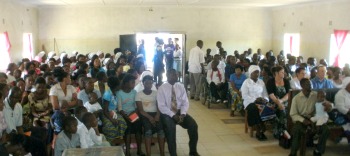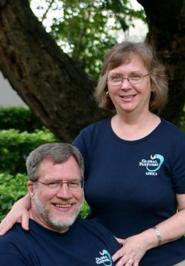
Guest Sermon Series
Rev. Robert D. Shofner, Jr.
St. John's UCC Boonville
Over the past few weeks, we’ve spent time together imagining what this world would look like if God really did bring “up there down here.” And we looked at ways we can start working together to help bring that about, remembering that God is close than we think.
Today is what is known as “Christ the King” Sunday. This Sunday tries to focus our worship on the cosmic character of Christ’s reign over the world. It is a celebration of the kingdom of God.
In the 13th chapter of Matthew, our Lord gives us some very powerful descriptions of what the kingdom of God is really like. He tells us about a man who, plowing in a rented field one day, uncovered a tremendous treasure. He quickly covered it up and gathered everything that he possessed and sold it, so that he could buy that field where the treasure was. Jesus said that the kingdom of God is so wonderful, so attractive, so inspiring, that those who discover it give up everything else to keep it.
Jesus went on to tell the tale of the merchant who dealt in precious jewels. All through his life he kept looking for that one, perfect, gem, valued above all others. Finally, he comes across a pearl, a perfect pearl, a pearl of great price. He is so excited that he sells his entire inventory … sells everything he possesses so he could buy that one pearl.
That, Jesus says, is the Kingdom of God.
The point is ….. Jesus told us that we are worried about too many things. We worry about what we’ll be having for lunch after church … will Mr. Gatti’s be too crowded and run out of barbeque chicken pizza? We worry about the quality of our tap water … and buy bottled water from somebody else’s tap and pay more for it than a gallon of gas. We worry about what we’re going to wear to that big party … and will someone notice our shirt came from WalMart? We worry about the stock market … will the endowment run out? Will we have enough to retire on? Will we be healthy, wealthy and wise?
Jesus says, “Enough worry! God knows what you need. Seek first His kingdom and His righteousness … and He’ll give you everything else.”
For those who’ve experienced just that … they know it’s true. Just ask the man who bought the field … ask the man who sold everything to buy that one pearl. Ask me! I’ve learned that God is completely faithful and true. I’ve learned that when I seek His kingdom and His righteousness He adds everything I need. I don’t need to worry about anything else. You don’t either. Everything that’s really needful …. anything that’s really worthwhile … God adds to our lives.
That’s a basic rearrangement of all our values, isn’t it? And that happens to us when we give ourselves completely to His kingdom … when we make it our first and top value. And we’ve said before, many times, that what we value determines the course of our life. What happens when we value God’s kingdom and righteousness above all else is that we discover, first hand, the love and grace of God. We come to know that there is not one thing you or I could do to ever make God stop loving us. And how do we respond to that certain knowledge? We love God.
Years ago, the United Church of Christ had a saying that was much better than the recent, “Never place a period where God has put a comma.” To me, that’s theological nonsense. No, years ago the UCC had a saying that was much more appropriate. It was, “To love is to care, to care is to do.” When we love, we care. And when we care, we serve.
There’s a story in the seventh chapter of Luke that makes this point. Our Lord is invited to dinner at the home of Simon, the Pharisee. Jesus rarely socialized with a Pharisee … but it was a free meal, so what the heck! Anyway, they had reclined around the low dinner table in the usual fashion, and as they were eating a woman, a prostitute actually, walked into the room. She came up behind Jesus and bent over His feet. She held those dirty, calloused feet in her hands and wept. She wept tears of remorse and shame. And her tears washed the dirt from His feet. She let loose her long hair and bent over His feet again and dried them with that hair. She brushed her hair back and tied it. She took a small bottle of perfume from under her sash. It was probably the same scent she would wear to entice her customers … and it wouldn’t have been cheap. She bent over His feet once again and began kissing them … kissing them as she poured that little bottle of perfume over the arch of His foot, spilling out between His toes.
Can we imagine the reaction of that stodgy, self-righteous Pharisee? He thought to himself, “This Man, if He were a prophet, would know who and what manner of woman this is who is touching Him, for she is a sinner!” (Luke 7:39).
And Jesus, who knows our thoughts and hearts and minds, said to His host: “Simon, I have something to tell you.” Simon said: “Say on, Lord.” “Simon, a certain banker had two debtors, one owed him five hundred dollars and one owed him five thousand. One day, he called them in and told them that both debts were forgiven and forgotten. Now, I ask you, Simon, which one of these two men responded with more gratitude?”
Simon said: “I assume the one who was forgiven the greater debt.” Jesus said: “You have spoken correctly.”
He then said: “Look at this woman. She has sinned much, but she loves more. When I came into your house, Simon, you offered me no water to wash my feet, which is just common courtesy. You brought no ointment with which to anoint my hair, which, as a good host, you should have. You gave me no kiss of peace when I entered your house, as you should have. This poor woman has washed my feet, has anointed me, and has not stopped kissing my feet since she came.”
And He looked down at the woman at his feet and said to her, “You faith” – really, her love – “your faith has saved you. You are forgiven. Peace be with you.”
That’s the Gospel. The greater the knowledge of our sin, the more gratitude for the forgiveness of that sin, the more love for our Lord. How do we express that love? To love is to care … to care is to do.
You may remember that in the final chapters of John’s gospel we read of how our Lord Jesus, risen from the dead, made His way about the country-side, and His own disciples – Peter among them – had seen Him risen, glorified, victorious over death – and yet, did nothing about it! They simply went back to Galilee and took up their fishing. One night, just at dawn, after an entire night of fishing, they were coming into shore when they saw a man standing by a fire on the beach.
Peter recognized Him, threw on some clothes, leaped into the surf and waded up to greet his Lord. They sat down and ate breakfast together, and as they were eating, Jesus looked at Peter … Peter who three times – even though he had been warned, cautioned against it – three times had denied his Lord.
Jesus looked across the fire at Peter and spoke. He didn’t use the nickname which Peter loved because the Lord had given it to him – Peter, Petros, the Rock – instead He said, “Simon, son of John, do you love me?”
Peter bowed his head in shame and said, “Yes, Lord, I love You.”
Jesus said, “Then feed my lambs.”
After a moment, Jesus said with more emphasis, “Simon, son of John, do you love me?”
“Yes, Lord, You know I love You!”
“Then tend my sheep.”
And then a third time – and I’m sure Peter, by that time, realized it must be three times, since his denial had been thrice.
“Simon, son of John, do you love me?”
“Lord, You know all things. You know the thoughts of men’s hearts. You know that I love You!”
“Then feed my sheep.”
That’s the job, little man. What are you doing here fishing? If you love, then you must do. You have a job.
In the 25th chapter of Matthew, Jesus is speaking about the end of times. He says;
"When the Son of Man comes in his glory, and all the angels with him, he will sit on his throne in heavenly glory. All the nations will be gathered before him, and he will separate the people one from another as a shepherd separates the sheep from the goats. He will put the sheep on his right and the goats on his left.
"Then the King will say to those on his right, `Come, you who are blessed by my Father; take your inheritance, the kingdom prepared for you since the creation of the world. For I was hungry and you gave me something to eat, I was thirsty and you gave me something to drink, I was a stranger and you invited me in, I needed clothes and you clothed me, I was sick and you looked after me, I was in prison and you came to visit me.'
"Then the righteous will answer him, `Lord, when did we see you hungry and feed you, or thirsty and give you something to drink? When did we see you a stranger and invite you in, or needing clothes and clothe you? When did we see you sick or in prison and go to visit you?'
"The King will reply, `I tell you the truth, whatever you did for one of the least of these brothers of mine, you did for me.'
"Then he will say to those on his left, `Depart from me, you who are cursed, into the eternal fire prepared for the devil and his angels. For I was hungry and you gave me nothing to eat, I was thirsty and you gave me nothing to drink, I was a stranger and you did not invite me in, I needed clothes and you did not clothe me, I was sick and in prison and you did not look after me.'
"They also will answer, `Lord, when did we see you hungry or thirsty or a stranger or needing clothes or sick or in prison, and did not help you?'
"He will reply, `I tell you the truth, whatever you did not do for one of the least of these, you did not do for me.'
"Then they will go away to eternal punishment, but the righteous to eternal life." (Matthew 25:31-46)
You and I know that there are many hungry, thirsty, naked, imprisoned, sick lambs of God around this world. How can we witness to them? How can we reach them all? The truth of the matter is, we can’t reach them all. But we can touch the lives of many.
This is where the Church of Jesus Christ, this is where St. John’s United Church of Christ gives each of us the opportunity to serve. The long arms of the Church can reach into every corner of the world and feed the hungry, welcome the stranger, minister to the sick, visit the imprisoned. And all that witnesses to our love for Christ. The money I give to this church helps me carry out the command given to Peter … and to all who love the Lord … “Feed my sheep. If you love me, then feed my sheep.”
On the other hand, if we don’t love Him, I could stand up here and preach stewardship until I’m blue in the face. I could point out the reasonableness of the whole thing, and it will run off us like water off the beard of a left-handed goat. It would mean nothing.
But when we love the Lord, as many of us do in gratitude for the love and forgiveness and grace He has given us, then we have the opportunity of showing that love through our good works … our stewardship … ministering to the lowliest and neediest of His children.
I, for myself, think of the words of that old hymn:
Where the whole realm of nature mine,
That were a tribute far too small;
Love so amazing, so divine,
Demands my soul, my life, my all.
Let’s pray.
Lord of all creation, the sacrifice You made for us is so amazing, so divine. When we think on how wretched we are without You, it brings us to our knees in gratitude and love. And because we love You, we care about your brothers and sisters. And because we care, we serve. May our service bring honor and glory unto You. For that is our purpose, to know You and bring honor to You.
And the people said, “Amen.”









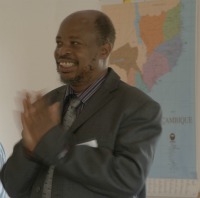
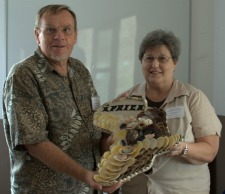
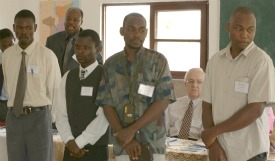 The vision of the Mozambique church in the past decade has been to see the Wesleyan Church established in every province of their nation. To that end they have commissioned four recent Bible College graduates to serve as "internal" missionaries who have traveled to new areas, learned a new language, and proceeded to oversee the planting of new churches. (In the photo on the left Rev. Nhathelo introduces their missionaries to the conference - from the left: Pastor Zito Alfoi, serving in Niassa Province; Rev. Alberto Adamuge, serving in Cabo Delgado Province; and Rev. Abel Nove and Rev. Alberto Chicana, serving in Nampula Province.)
The vision of the Mozambique church in the past decade has been to see the Wesleyan Church established in every province of their nation. To that end they have commissioned four recent Bible College graduates to serve as "internal" missionaries who have traveled to new areas, learned a new language, and proceeded to oversee the planting of new churches. (In the photo on the left Rev. Nhathelo introduces their missionaries to the conference - from the left: Pastor Zito Alfoi, serving in Niassa Province; Rev. Alberto Adamuge, serving in Cabo Delgado Province; and Rev. Abel Nove and Rev. Alberto Chicana, serving in Nampula Province.)